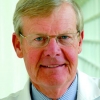(RxWiki News) Coffee is among the most popular drinks on the planet. Besides the pep that the caffeine provides, a cup of joe just tastes good. Recent research suggests that this beloved beverage may also offer some health benefits for prostate cancer survivors.
Results from a new study showed that prostate cancer survivors who drank the most coffee prior to diagnosis had much lower risks of their cancer returning or getting worse than men who drank only small amounts.
The authors cautioned that this study shouldn’t change a man’s coffee drinking habits. Rather, men who like lots of coffee can continue to enjoy it.
"Enjoy your coffee."
Janet L. Stanford, PhD, co-director of the Program in Prostate Cancer Research, and other scientists at Fred Hutchinson Cancer Research Center in Seattle, Washington, tested the influence both coffee and tea had on the progression of prostate cancer.
This study involved 1,001 prostate cancer survivors between the ages of 35 and 74 at the time they were diagnosed between 2002 and 2005.
Study members completed a detailed questionnaire about the foods they ate and beverages they drank two years prior to their prostate cancer diagnosis.
The researchers interviewed patients about other lifestyle habits such as smoking, drinking and exercise habits, medication use, family history of cancer and their own cancer screening history.
The researchers followed up with the men more than five years following their diagnosis to see if the prostate cancer returned and/or progressed.
The final analysis was based on the responses of 630 men.
The researchers looked at the following groups of men based on coffee consumption: one cup or less a week, one cup a day, two to three cups a day and four or more cups daily.
In addition to coffee intake, the researchers factored in such things as body mass index (BMI — amount of body fat based on height and weight), aspirin and nonaspirin use, diabetes history, consumption of tea among the coffee drinkers and coffee consumption among the tea drinkers.
The researchers learned that prostate cancer survivors who drank four or more cups of coffee a day had a 59 percent lower risk of disease return and/or progression than men who drank one or fewer cups of coffee per week.
Drinking other amounts of coffee also had risk-lowering benefits. Survivors who drank one cup of coffee a day had a 56 percent lower risk, and those who drank two to three cups of coffee a day had a 28 percent lower risk than men who rarely drank the beverage.
Coffee drinking was not linked to lower death rates among prostate cancer survivors; however, there were too few deaths among the study members for this to become a separate measure.
There was no association between tea drinking and prostate cancer recurrence risks, according to the study.
“It is important to note, however, that few patients in our cohort were regular tea drinkers and the highest category of tea consumption was one or more cups per day. The association should be investigated in future studies that have access to larger populations with higher levels of tea consumption,” the authors wrote.
E. David Crawford, MD, professor of surgery, urology and radiation oncology and head of the Section of Urologic Oncology at the University of Colorado Health Sciences Center in Denver, told dailyRx News that the study was "some more good news for coffee drinkers, a significant reduction in recurrence. Prior studies just touted the value of tea."
Despite the positive findings of this study, the authors warn that until further study in a randomized trial, coffee can’t be considered a method for preventing prostate cancer.
First author Milan Geybels, a doctoral student at Maastricht University in the Netherlands who was a graduate student in Stanford’s Prostate Studies group at Fred Hutch when the study was conducted, cautioned, “Although coffee is a commonly consumed beverage, we have to point out that increasing one’s coffee intake may be harmful for some men. For instance, men with hypertension may be vulnerable to the adverse effects of caffeine in coffee.”
The study had its limitations, including lack of information on the types of coffee consumed, how it was prepared and changes in coffee consumption after diagnosis.
These research findings were published in the August issue of Cancer Causes & Control.
The National Cancer Institute, Fred Hutchinson Cancer Research Center, Prostate Cancer Foundation and Dutch Cancer Society funded the research. No conflicts of interest were disclosed.







